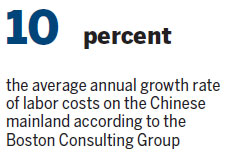Dongguan firms to set up industrial park in US
Updated: 2015-09-15 08:15
By Zhou Mo in Shenzhen(HK Edition)
|
|||||||
Gains far outweigh higher labor costs as mainland firms head west to cut transport expenses and beat trade barriers
After making their mark in Southeast Asia and Africa, enterprises from Dongguan, Guangdong province, are now focusing on new frontiers further afield.
A group of Dongguan firms have decided to set up a 60,000-square-meter industrial park in the US state of Arkansas and move a part of their production there. The manufacturing base is expected to be completed and begin operation by early next year.
KingBall Group is among the first companies to have confirmed the westward move. The enterprise, which specializes in producing toys and stationery, will be the first to experience what "Made in the US" feels like, and is also prepared to take up the challenge of operating in one of the world's most strictly regulated and high-cost labor markets with stringent quality guidelines.
"This is our first try. There are underlying risks, of course. But if we run it well, a number of firms will follow," said Lan Junxiong, an executive at KingBall.
Indeed, much higher labor costs compared with those in Dongguan will be a major challenge.
"Ordinary workers in Arkansas normally earn $2,000 monthly. That is equivalent to more than 12,000 yuan," Lan says.
That is also more than double the usual monthly wages of 5,000 yuan earned by workers in the southern Guangdong city.

But even the low-wage-level attraction of Dongguan is beginning to fade for company owners in the city. Many entrepreneurs have in fact been complaining about rising labor costs, and some have already taken action by moving production factories to cheaper regions, like Southeast Asia or Africa.
A research report by the Boston Consulting Group, a US-based management consulting firm, says labor costs on the mainland have been growing at an average annual rate of 10 percent over the past few years.
But why move to the US? It seems incomprehensible that cost-sensitive manufacturers are now tapping into a place costlier than not only the mainland, but a large part of the world as well.
But companies aiming to relocate believe that localized production would help reduce transportation expenses.
More importantly, they get something else - something invisible but essential.
"By setting up factories in the US, manufacturing companies are able to hire high-quality local labor and learn advanced technologies," says Chen Xiuzhen, director of the South China and Shenzhen-Hong Kong Economic Research Center at China Development Institute, a Shenzhen-based think tank.
"Moreover, (US) trade barriers can be avoided through this means."
According to the World Bank, 6.4 percent of mainland exports to G20 economies in 2013 encountered Temporary Trade Barriers (TTB), with 9.1 percent of mainland exports to the US subjected to TTB imposed by the country the same year, marking the sixth-highest rate among US trading partners worldwide.
"Unlike their previous shift to Southeast Asian and African countries, which was driven by lower manpower costs, the action of Dongguan enterprises this time can be seen more as strategic behavior, which has something to do with the global value chain," says Mao Yanhua, professor at the Center for Studies of Hong Kong, Macao and Pearl River Delta and deputy head of the Free Trade Zone Research Institute at Guangzhou's Sun Yat-sen University.
"For industries like shoe or garment manufacturing, it is still the purchasing side that plays the leading role in the chain. The move by Dongguan enterprises, mostly suppliers for (US supermarket chain) Walmart, will help them get closer to purchasers and take better advantage of the benefits brought by local policies."
Meanwhile, the business environment in the US is more favorable than in Southeast Asian and African nations, Mao added. "This is quite important in reducing the overseas investment risks of companies."
But transfer to a better environment is not an antidote in itself. Enterprises may gain little from the move if they continue to deal with low-end processing businesses and fail to develop their core competitiveness, Chen warned.
"When enterprises consider going out to the US, they need to first consider whether they have the necessary strengths to overcome the disadvantage of high labor costs - such as a competitive edge in brand or technology," she said. "Only when they develop these strengths can they achieve success in the country."
The city of Dongguan has been known for its low-end processing trade. But it has been stepping up efforts to upgrade its industrial structure amid the mainland's economic slowdown and rising labor costs in coastal areas. He Yu, deputy mayor of Dongguan, said in June that the city had over 200 enterprises currently using robots in the production process.
Investment in developed and high-end consumer markets is a new field for small- and medium-sized mainland enterprises, Mao at the Sun Yat-sen University pointed out.
sally@chinadailyhk.com
(HK Edition 09/15/2015 page8)